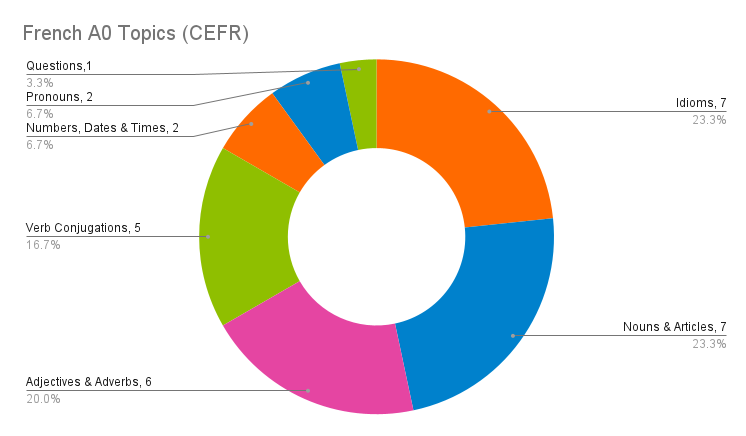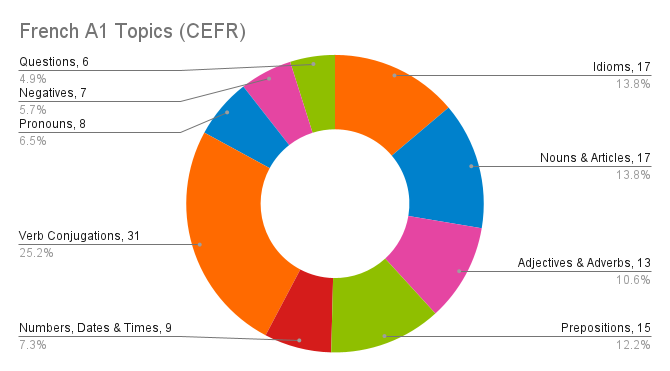Table of Contents
- DELF A1 exam structure
- Knowledge needed for DELF A1 exam
- How to study for DELF A1 exam
- Find the tools you need
Would you like internationally recognised proof that you're proficient in A1 French? Then you may be considering the DELF A1 exam.
According to the Institut Francais, the DELF exams provide the only official French language diplomas today. They're a versatile tool to have under your belt and on your CV!
But how does the A1 exam work, and how can you prepare for it? Read this DELF A1 exam guide to find out.
DELF A1 exam structure
The DELF A1 exam is approximately 1 hour 35 minutes long. In that time, reading, writing, speaking, and listening skills will be tested.
Reading
- Duration: 30 minutes
- Points: 25 points
- Tasks: 4 exercises involving reading passages and answering questions
Writing
- Duration: 30 minutes
- Points: 25 points
- Tasks: 2 exercises involving filling out a form and writing a message of 40+ words
Speaking
- Duration: 10 minutes prep, 5-7 minute exam
- Points: 25 points
- Tasks: 3-part test:
- Guided conversation
- Exchanging information
- Role-play
Listening
- Duration: Approximately 20 minutes
- Points: 25 points
- Tasks: 4 exercises involving listening to recordings and answering questions
To pass the DELF A1 exam, you need to score at least 50/100 points. You must also score at least 5/25 in each section.
Knowledge needed for DELF A1 exam
To ensure your skills are up to scratch for the exam, we suggest you study both A0 and A1 French. Then you can be sure that your A1 knowledge and skills have a solid base, and you hopefully won't make silly mistakes on the day.
A0 French knowledge
Here are the topics covered in A0 French:

Learn French With Alexa and Kwiziq has a huge amount of lessons, exercises, and kwizzes to help you perfect your A0 level French. Here are just a few examples of the lessons we have per topic:
- Nouns and Articles
- Adjectives and Adverbs
- Numbers, Dates and Time
- Verbs and Conjugation
- Forming Questions
- Pronouns
- Idioms
See our full list of A0 French grammar lessons here!
A1 French knowledge
Once you've perfected the basics, you can build on them with A1 level French. Here's how this knowledge is distributed:

As the chart explains, A1 French is much more varied. The topics and grammar you're expected to be familiar with grow significantly.
But don't feel overwhelmed – it's still beginner-level French. And you only need 50/100 points to pass. Still, we recommend you study all of these areas so no question catches you off guard.
Here's a list of some of our A1 lessons per topic:
- Nouns and Articles
- Adjectives and Adverbs
- Prepositions
- Numbers, Dates and Time
- Verbs and Conjugation
- Forming Questions
- Negatives
- Pronouns
- Idioms
Use our free A1 lessons and exercises to get started!
How to study for DELF A1 exam
Now you know what to study, how should you start?
First of all, use a language learning tool that follows the CEFR levels. Then you know you're learning the right skills for your ability.
As for what study methods work best for DELF A1, we've written a whole article on that just for you!.
Find the tools you need
Study up on A0 and A1 level French with Learn French With Alexa and Kwiziq's free study tools!
Get access to all our free lessons and exercises, plus 10 kwizzes a month! Kwizbot will make a custom Study Plan and Brainmap just for you, so you can plan and track your progress. All of this will be available to you with a Learn French With Alexa and Kwiziq free account, so sign up today!
If you're ready for your French DELF A2 exam read about the topics it covers or keep browsing through our list of 8 official French proficiency tests and diplomas to see which is the right one for you.
